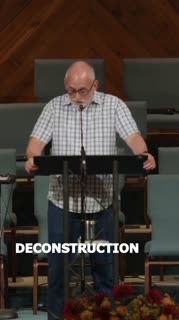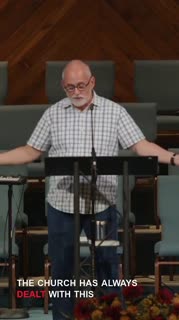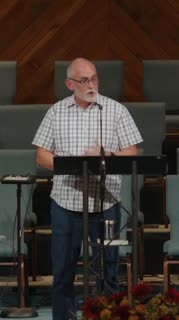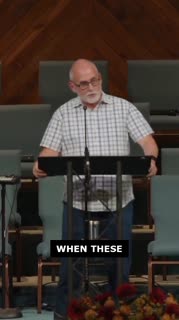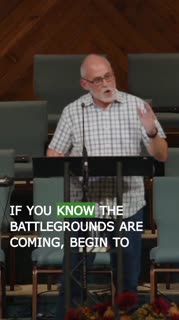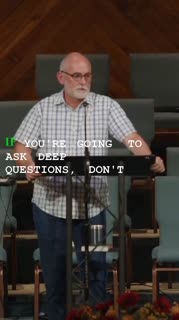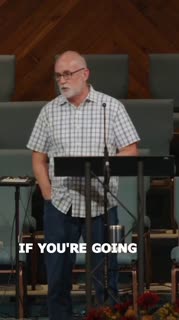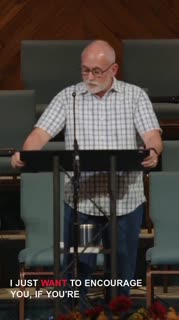Guarding the Faith Amidst Deconstruction Challenges
Devotional
Sermon Summary
Bible Study Guide
Sermon Clips
1) "Deconstruction is an exit ramp from the gospel of Jesus Christ to the highway of new atheism. And what we're going to see today is going to be a car bodies, going to be a car bodies, or something like that. is while this phrase is trendy, hashtag ex-evangelicism and hashtag deconstruction, while it's very trendy, it really is nothing new. This spiritual battle literally is as old as creation itself. The very first Bible story you know of, the very first story in the Bible, is Satan coming to try to lead someone to deconstruct their faith." [03:18] (34 seconds)
2) "The church has always dealt with this reality, that there will be many who will positively respond to the gospel, but as they get into it, they will swerve away from the faith. So while deconstruction is very trendy on social media, it is nothing new under the sun. And there's nothing new to the church. In fact, the very first Bible story that you know of Adam and Eve in the garden is just an attempt of Satan to get them to deconstruct their faith. What's the first thing Satan did? He questioned or twisted the words of God." [11:19] (31 seconds)
3) "Questions are good. It's okay to ask questions about our faith. In fact, the mark of a cult is that you can't ask questions. You know, the cult's like, don't question anything, don't question anything. We're not a cult. We encourage questions. The Scriptures encourage questions. Read the Psalms. The Psalms, the prayer book of the Bible, are constantly questioning God. I read Psalm 13 this morning. Where are You, God? How long? Have You forgotten about me? Why are You hiding Your face from me? Have You forgotten to be good? I mean, it's these questions about God. And so questions are good." [13:00] (34 seconds)
4) "The problem is when these questions become triggers that lead us away from orthodox gospel. So this book, Blake recommended this to me, Deconstruction of Christianity, mentioned it in the Thessalonians. First service this morning, and several of y'all have already read it, so you may have read it. If you're interested in it, you can find me after church, I'll give you the author and publication and all. But in that book, it talks about some of the common triggers that trigger people to head off onto this path of deconstructing your faith. And the six that it listed in the book, number one was suffering." [13:33] (32 seconds)
5) "If you know the battlegrounds are coming, begin to prepare your faith, and fight. Peter said in first, second Peter, be all the more diligent to confirm your calling in election, for if you practice these qualities, you will never fall, for it's in this way that you're richly provided an entrance into the eternal kingdom of our Lord and Savior Jesus Christ. The way that we know that we are continuing in the faith, and confirming our faith, is we persevere to the end in our belief, and we're continuing to bear fruit, and we're continuing to bear fruit of being a new creation in Christ." [23:09] (39 seconds)
6) "If you're going to ask deep questions, don't settle for shallow answers. With all due respect, whatever question that you have, I can promise you that I'm going to answer it. I'm going to answer it on the same day that all the actions that are being performed are being performed right now and in the spirit of a serious question. Time to ask questions, then I'm going to ask that simple question. If you're going to ask a question that is given to you by God, that you think isrier than you thought it was, or that is clear enough, whatever question that lives within you, if you are asking yourself the same question a couple of times, you're talking about a rather material question that you could not guess what that question was, either the person that ever asked that question that you trust drawing to yourself, or the person that starts to be answered and who might be good at this, this or that you were going to ask it, you should definitely look but there's an entire branch of Christian theology devoted to that single question." [25:51] (43 seconds)
7) "If you're going to reject the orthodox Christian gospel, what are you left with? Where did everything come from? Well, from the Big Bang and everything's been expanding out from that, okay, talk to me about thirty seconds before the Big Bang. Where did the stuff come from that banged? Why did it bang? Talk to me about that. And if you say, well, the multiverse is the answer to that, it takes more faith to believe in the multiverse than it does to believe in a Creator. And there's no scientific evidence for multiverse. But… But… Intellectually, be honest with yourself. Where did everything come from? How do we know what is right and what is wrong?" [30:19] (37 seconds)
8) "I just want to encourage you, if you're deconstructing and wrestling with this and rejecting this, have the intellectual honesty to say, okay, well, if it's not that, then it's going to be this. And define this. And define this with as much clarity as this defines that. And just also remind you, right, gospel truth, eternal truth, any truth really, is not determined by the number of Instagram followers, right? It's very popular and it's very trendy and you can get online and it feels like everybody's doing it. Well, it doesn't matter if everybody's doing it." [33:17] (34 seconds)
Ask a question about this sermon
2) "The church has always dealt with this reality, that there will be many who will positively respond to the gospel, but as they get into it, they will swerve away from the faith. So while deconstruction is very trendy on social media, it is nothing new under the sun. And there's nothing new to the church. In fact, the very first Bible story that you know of Adam and Eve in the garden is just an attempt of Satan to get them to deconstruct their faith. What's the first thing Satan did? He questioned or twisted the words of God." [11:19] (31 seconds)
3) "Questions are good. It's okay to ask questions about our faith. In fact, the mark of a cult is that you can't ask questions. You know, the cult's like, don't question anything, don't question anything. We're not a cult. We encourage questions. The Scriptures encourage questions. Read the Psalms. The Psalms, the prayer book of the Bible, are constantly questioning God. I read Psalm 13 this morning. Where are You, God? How long? Have You forgotten about me? Why are You hiding Your face from me? Have You forgotten to be good? I mean, it's these questions about God. And so questions are good." [13:00] (34 seconds)
4) "The problem is when these questions become triggers that lead us away from orthodox gospel. So this book, Blake recommended this to me, Deconstruction of Christianity, mentioned it in the Thessalonians. First service this morning, and several of y'all have already read it, so you may have read it. If you're interested in it, you can find me after church, I'll give you the author and publication and all. But in that book, it talks about some of the common triggers that trigger people to head off onto this path of deconstructing your faith. And the six that it listed in the book, number one was suffering." [13:33] (32 seconds)
5) "If you know the battlegrounds are coming, begin to prepare your faith, and fight. Peter said in first, second Peter, be all the more diligent to confirm your calling in election, for if you practice these qualities, you will never fall, for it's in this way that you're richly provided an entrance into the eternal kingdom of our Lord and Savior Jesus Christ. The way that we know that we are continuing in the faith, and confirming our faith, is we persevere to the end in our belief, and we're continuing to bear fruit, and we're continuing to bear fruit of being a new creation in Christ." [23:09] (39 seconds)
6) "If you're going to ask deep questions, don't settle for shallow answers. With all due respect, whatever question that you have, I can promise you that I'm going to answer it. I'm going to answer it on the same day that all the actions that are being performed are being performed right now and in the spirit of a serious question. Time to ask questions, then I'm going to ask that simple question. If you're going to ask a question that is given to you by God, that you think isrier than you thought it was, or that is clear enough, whatever question that lives within you, if you are asking yourself the same question a couple of times, you're talking about a rather material question that you could not guess what that question was, either the person that ever asked that question that you trust drawing to yourself, or the person that starts to be answered and who might be good at this, this or that you were going to ask it, you should definitely look but there's an entire branch of Christian theology devoted to that single question." [25:51] (43 seconds)
7) "If you're going to reject the orthodox Christian gospel, what are you left with? Where did everything come from? Well, from the Big Bang and everything's been expanding out from that, okay, talk to me about thirty seconds before the Big Bang. Where did the stuff come from that banged? Why did it bang? Talk to me about that. And if you say, well, the multiverse is the answer to that, it takes more faith to believe in the multiverse than it does to believe in a Creator. And there's no scientific evidence for multiverse. But… But… Intellectually, be honest with yourself. Where did everything come from? How do we know what is right and what is wrong?" [30:19] (37 seconds)
8) "I just want to encourage you, if you're deconstructing and wrestling with this and rejecting this, have the intellectual honesty to say, okay, well, if it's not that, then it's going to be this. And define this. And define this with as much clarity as this defines that. And just also remind you, right, gospel truth, eternal truth, any truth really, is not determined by the number of Instagram followers, right? It's very popular and it's very trendy and you can get online and it feels like everybody's doing it. Well, it doesn't matter if everybody's doing it." [33:17] (34 seconds)
